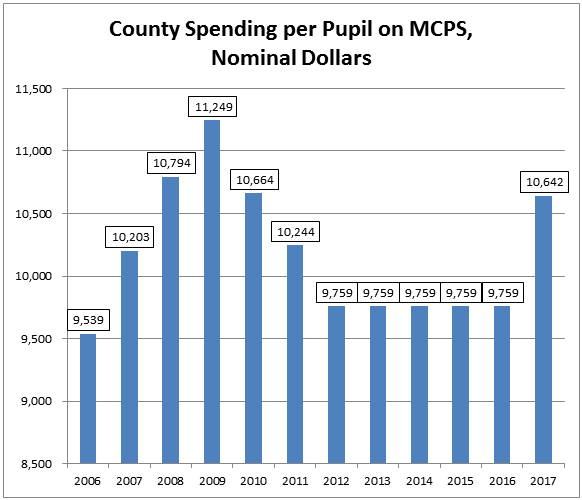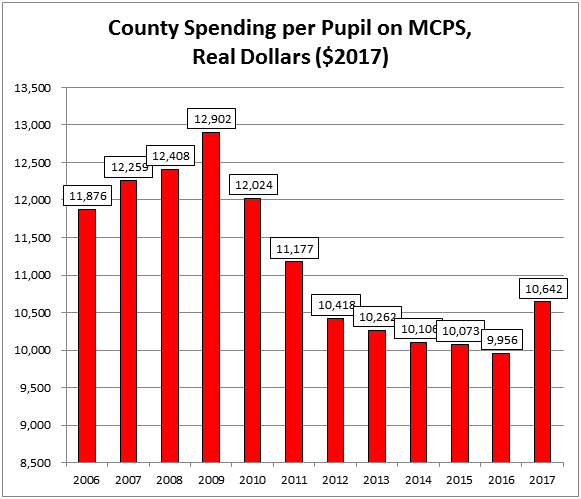After Adam Pagnucco’s terrific and thought-provoking post from yesterday, I had an interesting conversation with Councilmember Nancy Floreen on Facebook. A very smart and knowledgeable former Council President who is happy to defend her record, the conversation was inadvertently helpful to me in understanding why term limits passed so overwhelmingly.
They Don’t Get It. At All.
Voters didn’t quite say “You have sat too long for any good you have been doing lately. . . Depart, I say; and let us have done with you. In the name of God, go!” in the manner of Oliver Cromwell to the Rump Parliament (repeated famously by a Conservative MP to Neville Chamberlain). But a 70% vote in favor of term limits is pretty darn close.
Yet, reflecting a common view on the Council, Nancy Floreen ascribes no meaning to the vote whatsoever, including viewing it as a vote against the status quo (see full Facebook exchange here). In short, there is now a yawning gap between how councilmembers see their work and the County government, and how voters see them.
This ostrich-like response on term limits–and even though I voted against them and really like and respect Nancy, I don’t know what else to call it–vividly demonstrates this distance and why voters supported them.
The Divorce
On reflection, I realized that something fundamental has changed about how voters see the County government. When I was a more of whippersnapper, people had a much more positive view of the County government. Yes, people paid a lot in taxes but the results were visible in terms of quality services from excellent schools to parks to libraries that made it a great place to raise kids.
People are now much more divorced from their County government–and not just because our population has doubled. Traffic, always bad, is now far worse. We’ve gone through a long period in which taxes have gone up but visible outputs in terms of those excellent services, such as libraries, are going down.
People even worry increasingly about the quality of our beloved school system and whether they’re getting value for money. Metro is no longer spanking new but decaying and dysfunctional. Other infrastructure from electric wires to gas lines to water mains needs replacement.
Why Did Voters Want to Throw the Bums Out?
Many of the problems that the County faces have little to do with its current membership. At least part of the term limits vote stems from having gone through a tough period when difficult, unpopular choices had to be made. And yet, the reasons that voters decided to make the psychological trial separation from the County a full-scale divorce via term limits go beyond that.
The Bubble
County Councilmembers are insulated from the public unless they make a strong effort. The highly symbolic locked door that prevents the plebeian masses from even entering their offices is just the start of it. Staff insulates councilmembers from the public, both by fielding calls and answering email.
Besides naturally supportive staff, councilmembers get a lot of positive feedback from visitors. After all, people lobbying for something tend not to want to alienate the Council. After 12 or 16 years, who wouldn’t be changed by that?
Two Electorates
Roughly 10% of eligible voters participate in the Democratic primaries that elect our local officials. Turnout in Montgomery has been stagnant, so politicians focus on the increasingly small share of people who participate in these contests.
The focus on the odd few of us who vote consistently in Democratic primaries leaves the rest feeling disengaged from politics, as politicians sensibly don’t reach out to them at election time because it won’t help them win.
It also leaves politicians with a pretty warped sense of what the average voter wants because the few who participate in primaries of either party tend to be more extreme than not just the average voter but also the average member of their party.
Term limits was one of the few ways that the other 90% could express dissatisfaction with local officials in a meaningful way other than casting a symbolic vote for a Republican, a brand tarnished by national Republicans that mostly fields weak or even nutty candidates here.
Confusing Congress and Local Government
Too many members of the Council seem to want to be national legislators and opine on the great national issues of the day. Increasingly, this creeps into legislation with more time spent on issues away from core functions.
I miss those wonderful ads with Doug Duncan taking out a voter’s trash. To voters, this said that he got it. One reason County Executive Ike Leggett was able to turn back challenges to his leadership despite being the man in charge at a difficult time was that (1) he showed an unusual capacity for listening at events around the county, and (2) he responded to voters with not just deep fluency on local issues but also a respect for voter concerns. At a town hall meeting with Ike, voters always felt heard.
Property Taxes
Most people’s salaries have been stagnant. Nonetheless, the County raised taxes by over 9%. At a time when many voters find it hard to live within their means, the County made it harder by increasing taxes. As it turns out, berating voters that they don’t care about schools or social justice if they feel this way doesn’t work.
In other words, it is time for the County to start to figure out how to live within its means. Maybe this means tax reform of some sort–no, not in the guise of a massive tax cut like federal Republicans–such as eliminating loopholes that help some but not most of us. Councilmember and County Executive Candidate Marc Elrich made a good start by highlighting an old post by Adam on a tax break for country clubs. But it may also mean taking on labor to rein in costs, actions Councilmember Roger Berliner or Del. Bill Frick, also running for executive, are more likely to do.
The tax argument for term limits was made especially effective by the 28.1% pay increase that the Council voted to award itself in 2013. The Citizens Commission report had recommended a 17.5% increase in one year plus COLAs. That would’ve given the Council a 17.8% increase through 2016 based on the CPI for the Washington-Baltimore region. Comparing annual wages per employee in Montgomery County from 2013 and 2016 reveals that private sector wages have risen just 7.6% in current dollars.
The People v. The Powerful
Monied interests are way better at working Rockville than the rest of us. While members of civic associations are part-time volunteers who are not always up on the latest in ZTAs (zoning text amendments), developers and other powerful interests have expensive lawyers who know how to work the process.
This critique is very different than rich v. poor because the problem affects neighborhoods across the County. Developers and other interests can afford lawyers who can navigate them through the process and leave neighborhoods feeling powerless.
Social Engineering
This intersects with the social engineering tendencies of both the Council and the Planning Board. Personally, I think smart growth is generally a great thing that builds urban nodes like Silver Spring, Rockville and Bethesda where many people want to live or to spend time.
At the same time, it needs to be done with sensitivity and awareness of existing neighborhoods. Most people moved out here for the suburban lifestyle of a house and a yard. They don’t appreciate being told that they’re outdated and even being demonized for caring about their neighborhoods and worrying about whether the infrastructure can handle the growth.
Moreover, those who have lived here a long time have a healthy suspicion of urban planners. In the 1970s and 1980s, these are the same people who told us that elevated urban plazas behind office buildings were the wave of the future. Total disaster.
I think they’ve got it more right this time with smart growth. But carrying it out in such an ideological manner that dismisses neighborhood concerns alienates the people who are supposed to be served. Downcounty residents are mighty tired of hearing patronizing talk of how much they’ll like that new 30-story building looming across the street from their home. Or that traffic is good because it will force us to ride the decaying Metro that doesn’t take us to the supermarket.
Upcounty residents really do want some of those promised roads built and are real tired of begging. If you don’t believe me, check out the hundreds of petition signatures submitted by upcounty citizens (see below) who are deeply unhappy that Councilmember Hans Riemer’s proposed resolution on traffic solutions for the area drops the M-83 extension of the Midcounty Highway.
Put another way, start treating smart growth like a very good idea to be pursued in concert with residents rather than a new religion desperate to burn some heretics. The Council made a good start with the Bethesda Master Plan. It wasn’t perfect but it was a good process so kudos, especially to Councilmembers Roger Berliner, Marc Elrich and Hans Riemer. But concerns have already arisen that development will go beyond what is in the plan, as developers and their lawyers are already working the process.
Ferment in the Land
So yes, it’s definitely “a time for a change” election. Yet, we may end up with a crowd that has much the same views as the previous one but voters will welcome the change of faces. And, who knows, new faces may bring some good new ideas and approaches.
Here’s hoping.
M-83 Petition Signatories 101717 by David Lublin on Scribd




